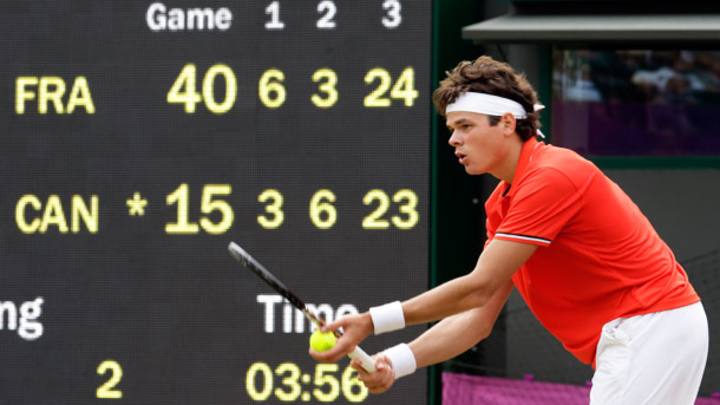Jo-Wilfried Tsonga, Milos Raonic finish record-setting marathon set

Milos Raonic (above) came up just short against Jo-Wilfried Tsonga, losing 25-23 in the third set. (AP)
Another day, another marathon tennis match? Hold that yawn, tennis fans. Sure, the lengthy matches have been coming more frequently these days, but let's face it, no one is ever going to eclipse the original marathon match between John Isner and Nicolas Mahut that ended 70-68 in the fifth set at Wimbledon in 2010.
Today's three-hour, 57-minute half-marathon between Jo-Wilfried Tsonga and Milos Raonic set itself apart insofar as it was, well, actually good. See, that's the dirty little secret about these matches that get pushed past the 6-6 mark in the final set and go on for an interminable amount of time. For the most part, they're actually not that great. Armed with huge serves, the men tend to bunker down, opting to focus almost entirely on the task of holding their serves. Rallies are few and far between, athleticism steps aside for energy conservation, and the men look like they're going for a nice stroll in the park. Does it make for dramatic tennis? Absolutely. Is it high quality, dynamic tennis? Not usually.
[polldaddy poll=6431143]
While Tsonga and Raonic weren't engaged in grueling rally after grueling rally, their near-four hour match, which Tsonga eventually won 6-3, 3-6, 25-23, had a third set that was high-quality and actually improved as it went on. Not unlike the Wimbledon men's final from 2009 -- which saw Andy Roddick continue to dig out holds while serving behind in the fifth set against Roger Federer -- the tension was high here as Raonic, the bigger server of the two, served from behind and bailed himself out of 0-30, 15-30 holes as Tsonga kept pressing. Raonic saved three match points before finally relenting on the fourth in a nutty point that involved Tsonga falling down, getting back up, and playing some cat and mouse tennis until finally hitting a winner. How thin were the margins here? Final point tally in the third set: Tsonga 129, Raonic 128.
It was a strong showing for Raonic, who again showed why he's the most highly touted talent of the next generation, but again fell short to lose a tight match. He's taken Roger Federer the full three in each one of their matches this year, only to fall short in either a third-set tiebreak (Halle and Madrid) or 6-4 (Indian Wells). Look at his 2012 match record and you see a number of tight, tough losses in big tournaments, which can mean one of two things: Either Raonic is on the verge of a huge breakthrough (those matches have to start falling his way sometime, right?) or he lacks the toughness to come through these types of battles. I'm inclined to go with the former.
These marathon matches are good for tennis, of that it's clear. What better way for the sport to grab headlines than to keep unveiling these "freak of nature" record-setting results? They generate interest and sometimes they can create stars (see: Isner, John). But are they that enjoyable to watch?
One thing's for certain: They don't seem all that enjoyable to play. Mardy Fish weighed in during the match and seemed to be in favor of a tiebreak:
http://twitter.com/MardyFish/statuses/230351978788683776
It's a sentiment I've heard often from players and coaches regarding the detrimental effect of the no-final-set-tiebreak rule. Matches like these can ruin a player's tournament -- Tsonga will have to turn around and play his third round match against Feliciano Lopez on Wednesday -- and in some cases, their years. Isner says it took him months to recover from his Wimbledon epic, where he was knocked out in the next round. Of course, those were five set matches, and hopefully Tsonga's match today shouldn't derail him too much.

Contributor, SI.com Nguyen is a freelance writer for SI.com, providing full coverage of professional tennis both on and off the court. Her content has become a must-read for fans and insiders to stay up-to-date with a sport that rarely rests. She has appeared on radio and TV talk shows all over the world and is one of the co-hosts of No Challenges Remaining, a weekly podcast available on iTunes. Nguyen graduated from the University of California, Irvine in 1999 and received a law degree from the University of California, Davis in 2002. She lives in the Bay Area.